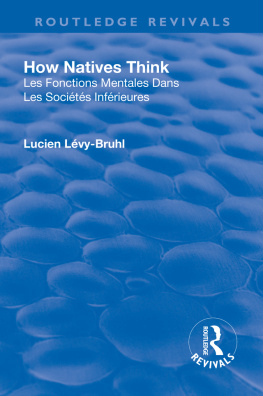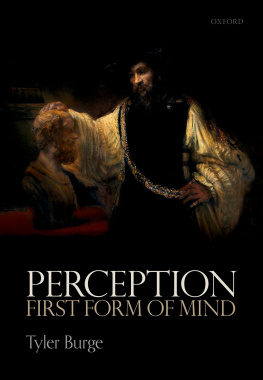HOW NATIVES THINK
BY THE SAME AUTHOR
PRIMITIVE MENTALITY
Demy 8vo, 16s.
Translated by LILIAN A. CLARE.
"A most erudite book.... Throughout its pages it is full of interest." British Medical Journal.
"May be warmly recommended as a thoughtful, learned and valuable contribution to the psychology of the savage." Times.
"The publication of this book is an event of importance not to anthropologists and psychologists only. It is a valuable and important contribution to its subject."
Spectator.
How Natives Think
(Les Fonctions Mentales Dans Les Societes Inferieures)
By
Prof. Lucien Lvy-Bruhl
of the Sorbonne
Authorized Translation
By
Lilian A. Clare
LONDON: GEORGE ALLEN & UNWIN LTD. RUSKIN HOUSE, 40 MUSEUM STREET, W.C. 1
Printed in Great Britain by
UNWIN BROTHERS, LIMITED, LONDON AND WOKING
First published in 1926
( All rights reserved )
LA MENTALIT PRIMITIVE, which appeared in English in 1923, and Les Fonctions Mentales dans les Socits Infrieures, published in the same language to-day, really make one and the same work in two volumes. It was due to the accident of circumstances alone that the second was translated into English before the first. The volumes can certainly be read separately, but, as the critics have remarked, the essential theories I maintain and the principles upon which I rely are all contained in the earlier one, now available to the English reader, and undoubtedly the two volumes will be best understood if read in the order in which they were written.
The fact that at this date, after having been submitted to the tests of time and experience, the theories maintained in Les Fonctions Mentales still seem to me to hold good, would possibly not be sufficient guarantee of their truthnor even the fact that my present researches in the same subject appear to confirm them. One is always fearful of being the dupe of flattering illusions concerning the cause he is pleading. Happily in this case I can appeal to other witnesses, less likely to be partial. Among those whose official functions, or vocations, bring them into constant relations with primitives, among the administrators and missionaries who share their everyday life, there are many who, hitherto strangers to me, have been good enough to write and tell me that these volumes have been of service to them. They say that the reading of Les Fonctions Mentales and La Mentalit Primitive helps them to comprehend much that had appeared both unintelligible and ridiculous in the way natives reason, and also in their customs, and that their relations with them are accordingly facilitated and improved.
In this I find the most valuable reward and the best encouragement that I can possibly receive, and this, too, emboldens me to present to-day to the English-reading public the translation of Les Fonctions Mentales, in the hope that it may be as well received as Primitive Mentality has been.
I also desire to express my thanks to Mrs. Clare for her excellent translation and for the care with which she has compiled the index.
L. LVY-BRUHL.
PARIS,
October 1925.
Contents
- CHAPTER I
COLLECTIVE REPRESENTATIONS IN PRIMITIVES' PERCEPTIONS AND THE MYSTICAL CHARACTER OF SUCH - CHAPTER II
THE LAW OF PARTICIPATION - CHAPTER III
THE FUNCTIONING OF PRELOGICAL MENTALITY
- CHAPTER IV
THE MENTALITY OF PRIMITIVES IN RELATION TO THE LANGUAGES THEY SPEAK - CHAPTER V
PRELOGICAL MENTALITY IN RELATION TO NUMERATION
- CHAPTER VI
INTITUTIONS IN WHICH COLLECTIVE REPRESENTATIONS GOVERNED BY THE LAW OF PARTICIPATION ARE INVOLVED (I) - CHAPTER VII
INSTITUTIONS IN WHICH COLLECTIVE REPRESENTATIONS GOVERNED BY THE LAW OF PARTICIPATION ARE INVOLVED (II) - CHAPTER VIII
INSTITUTIONS IN WHICH COLLECTIVE REPRESENTATIONS GOVERNED BY THE LAW OF PARTICIPATION ARE INVOLVED (III)
- CHAPTER IX
THE TRANSITION TO THE HIGHER MENTAL TYPES
- CHAPTER I
COLLECTIVE REPRESENTATIONS IN PRIMITIVES' PERCEPTIONS AND THE MYSTICAL CHARACTER OF SUCH - CHAPTER II
THE LAW OF PARTICIPATION - CHAPTER III
THE FUNCTIONING OF PRELOGICAL MENTALITY
- CHAPTER IV
THE MENTALITY OF PRIMITIVES IN RELATION TO THE LANGUAGES THEY SPEAK - CHAPTER V
PRELOGICAL MENTALITY IN RELATION TO NUMERATION
- CHAPTER VI
INTITUTIONS IN WHICH COLLECTIVE REPRESENTATIONS GOVERNED BY THE LAW OF PARTICIPATION ARE INVOLVED (I) - CHAPTER VII
INSTITUTIONS IN WHICH COLLECTIVE REPRESENTATIONS GOVERNED BY THE LAW OF PARTICIPATION ARE INVOLVED (II) - CHAPTER VIII
INSTITUTIONS IN WHICH COLLECTIVE REPRESENTATIONS GOVERNED BY THE LAW OF PARTICIPATION ARE INVOLVED (III)
- CHAPTER IX
THE TRANSITION TO THE HIGHER MENTAL TYPES
Guide
THE representations which are termed collective, defined as a whole without entering into detail, may be recognized by the following signs. They are common to the members of a given social group; they are transmitted from one generation to another; they impress themselves upon its individual members, and awaken in them sentiments of respect, fear, adoration, and so on, according to the circumstances of the case. Their existence does not depend upon the individual; not that they imply a collective unity distinct from the individuals composing the social group, but because they present themselves in aspects which cannot be accounted for by considering individuals merely as such. Thus it is that a language, although, properly speaking, it exists only in the minds of the individuals who speak it, is none the less an incontestable social reality, founded upon an ensemble of collective representations, for it imposes its claims on each one of these individuals ; it is in existence before his day, and it survives him.
This fact leads at once to a very important result, one on which sociologists have rightly insisted, but which had escaped the notice of anthropologists. To be able to understand the processes by which institutions have been established (especially among undeveloped peoples), we must first rid our minds of the prejudice which consists in believing that collective representations in general, and those of inferior races in particular, obey the laws of a psychology based upon the analysis of the individual subject. Collective representations have their own laws, and these (at any rate in dealing with primitivescivilized, white man." On the contrary, it is undoubtedly the study of the collective representations and their connections in uncivilized peoples that can throw some light upon the genesis of our categories and our logical principles. Durkheim and his collaborators have already given examples of what may be obtained by following this course, and it will doubtless lead to a theory of knowledge, both new and positive, founded upon the comparative method.
This great task cannot be accomplished save by a series of successive attempts. Perhaps their inception will be rendered easier if we determine which are the most general laws governing collective representations in undeveloped peoples. To find out exactly what are the guiding principles of primitive mentality, and how these make themselves felt in the primitive institutions and customs, is the preliminary problem with which we have to deal in this volume. Without the labours of those who have preceded methe anthropologists and ethnologists of various countriesand more particularly without the information afforded me by the French sociological school I have just mentioned, I could never have hoped to solve this problem, or even to present it in practical terms. The analysis by that school of numerous collective representations, and of the most important among them, such as the group ideas of what is sacred, of "mana," totem, magic and religious symbols, etc., has alone rendered possible this attempt to co-ordinate and systematize these representations among primitives. Basing my conclusions on those labours, I have been able to show that the mental processes of "primitives" do not coincide with those which we are accustomed to describe in men of our own type; I believe I have even been able to discover wherein the difference between them lies, and to establish the most general laws peculiar to the mentality of primitives.









